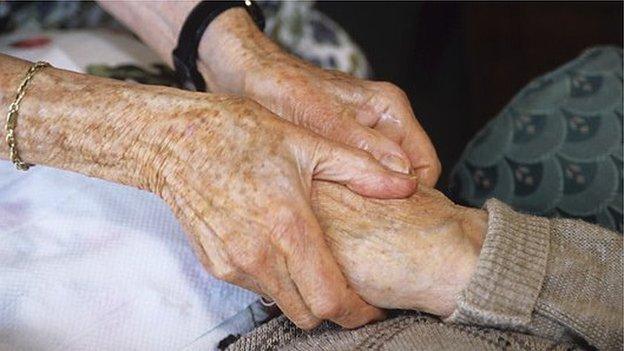The NHS and 'cradle to the grave'
- Published

About half of people die in hospital, but most people say they don't want to
The NHS was set up to provide health care from the cradle to the grave.
But is this really happening in today's NHS? If you read the latest report from the Royal College of Physicians you could be left wondering.
Doctors who carried out the audit said they found the standards of care provided to the dying "deeply worrying".
This followed last year's report by Baroness Julia Neuberger which was highly critical of the way the Liverpool Care Pathway - one aspect of end-of-life care - was being used.
But these concerns are not new. Back in 2000 the Department of Health's cancer plan was lamenting the fact that too many patients experienced "distressing symptoms, poor care and inadequate communication".
So what is going wrong? The reasons - as made clear by this latest report - are complex.
It is partly societal. Death still remains a taboo subject in England - and the rest of the UK for that matter.
A survey published earlier this month by the Dying Matters Coalition showed 83% of the public are uncomfortable discussing death.
That reluctance appears to have been transmitted to doctors. The survey showed a quarter of GPs did not initiate conversation with patients.
Attitudes
By comparison, in countries such as Spain there is much more openness about death and a natural acceptance that it is part of the cycle of life.
As a result, death is planned in advance, funerals are much more slanted more towards a celebration of life than an opportunity to grieve than they are here and, in terms of organ donation, the country is a world leader.
Even in the US, which has traditionally been much closer to the UK in approach, attitudes are changing thanks to initiatives such as The Conversation Project, external, which encourages people to start planning for death with their loved ones.

Claire Henry, of the National Council for Palliative Care, believes there needs to be a similar change in attitude here to what is after all, she says, "one of life's few certainties".
"Talking more openly about dying and planning ahead is in everyone's interests, as it can help ensure we get our wishes met and make it easier for our loved ones," she says.
But there also seems to be a problem with ensuring people die where they want to.
About half of deaths happen in hospital - yet 80% of people who die there have expressed a preference to die at home.
This is undoubtedly associated with a scarcity of hospice and community palliative care services in some areas.
But - and this is a point made by the authors of the RCP report - there is also evidence it is not being prioritised properly by hospitals.
Between 5% and 10% of patients who come into hospital end up dying there.
Dr Kevin Stewart, who authored the report, says this shows it should be seen as part of their "core business".
Yet it is quite clear it isn't. Specialist palliative care services are all too often only available Monday to Friday - something that is virtually unheard of in other areas, such as cardiac care.
While, at the top of trusts, there seems to be little appetite to tackle it head on. Less than half of trust boards had even discussed palliative care in the previous 12 months.
Death, it seems, is too much of a taboo subject everywhere.